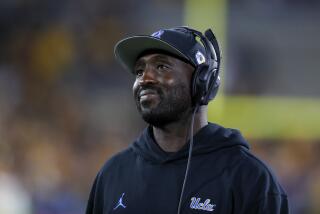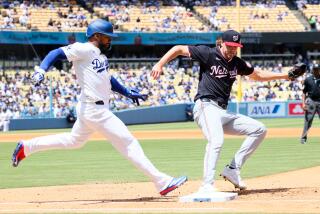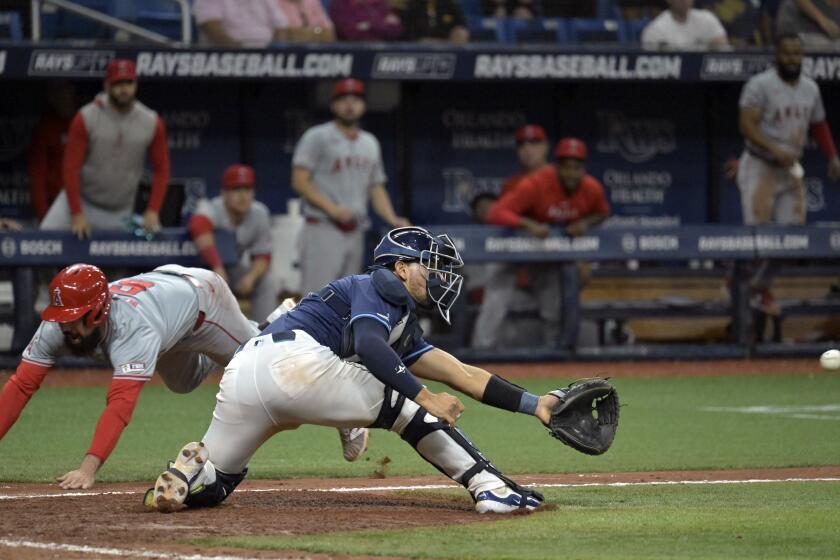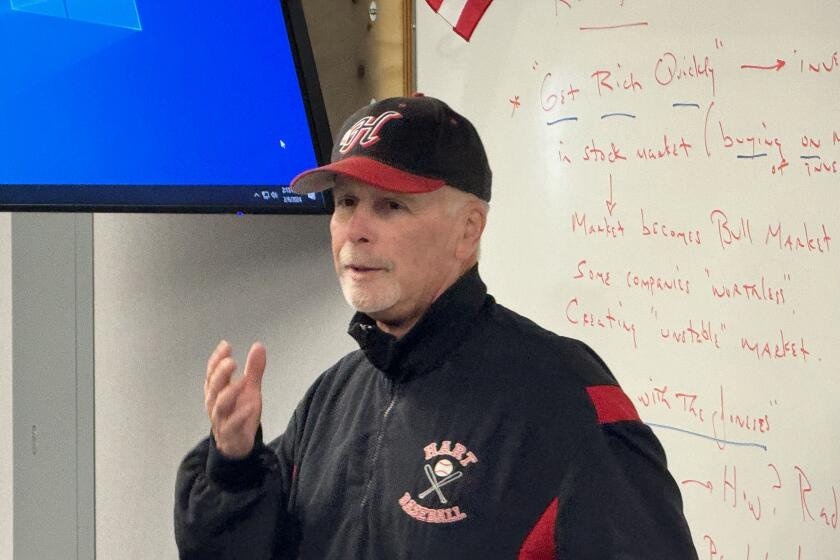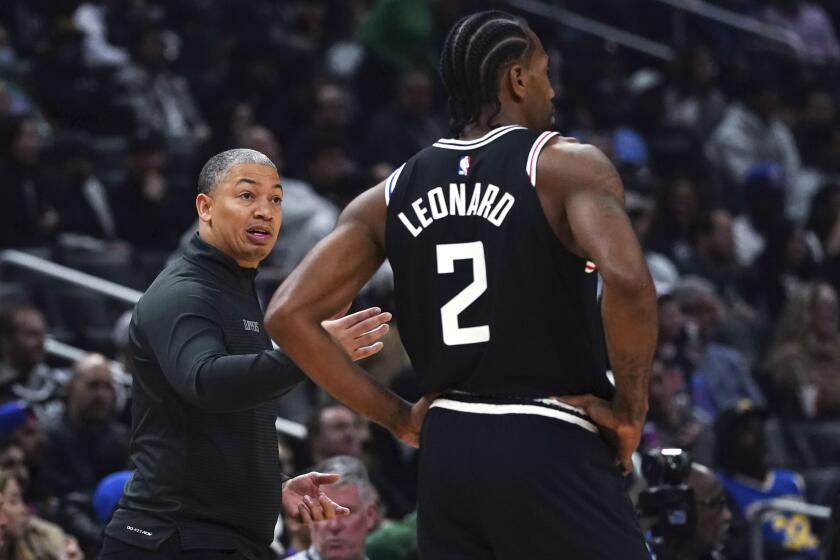Handball players push their prowess to the walls
The son of Rambo strides across the grassy field, girded for battle. He wears a T-shirt with the word “famous” all over it. Stainless-steel studs blink from his ears.
Two women hawk tortas, chips and bags of pumpkin seeds to more than 100 people filling the bleachers at Bristow Park in Commerce.
Ricky Ruiz steps onto the court. He takes off his shirt, revealing a gold crucifix, which he swings around to rest on his back.
His father, a muscle-bound, in-your-face character known as Rambo, bulls through the crowd. “Who wants to bet?” he cries. Men peel $20 and $100 bills from wads of cash.
Ricky’s challenger, Gilbert Rosales, 24, stands silently, looking like a 19th century bare-knuckled fighter with his mutton-chop sideburns. They call him “Boxer,” because he used to be one.
Ruiz prepares to serve. The crowd quiets; the crinkling of Flaming Hot Cheeto bags subsides. With his right hand, he sends the ball against the concrete wall. Moments later, he fires a “kill” into a corner, like a sinking fastball, and takes a 3-0 lead.
Handball has been a feature of urban life for generations, a pastime of laborers and lawyers, a fixture in parks, private clubs and prison yards, a passion that transcends class, religion and ethnicity.
In 1974, the poet Irving Feldman wrote of the “oiled and bronzing sons of immigrants, the handball players of the new world” at New York’s Brighton Beach, “who yawp, who quarrel, who shove, who shout themselves hoarse, who don’t get out of the way, grab for odds, hustle a handicap, all crust, all bluster, all con and gusto.”
He could have been describing the scene today at handball courts across Southern California.
Ruiz, 21, is one of the stars of that realm. Early mornings, he works for a traffic-management contractor, laying orange cones and closing streets. In the afternoon, the three-walled concrete courts beckon. Handball is a job too, and one he loves. When he’s on his game, he can earn a few hundred dollars from bettors in just a few hours.
“I can’t just sit at home. I have to get out here,” he says. “I believe I’m in my prime right now. I can just tell. I never felt this good before. If I play my game, I don’t feel I should ever lose.”
The best street handball players dominate a park, like gunslingers in a western. Ruiz’s home court is Bristow Park, but he plays all over — in La Puente, Venice Beach, East L.A., Lynwood, wherever he can find competition. His prowess is such that he sometimes plays with a handicap, just to coax an opponent onto the court. He’ll spot a challenger points or allow him to use a racquet. Or he’ll take on two people at once.
Boxer was too strong a player to expect any such concessions. Still, Ruiz was expected to win. The night before their match, he sat in the Bristow Park bleachers under floodlights, wearing braces on both knees, hoping to win a little money in low-stakes games while watching his father and brother play.
He didn’t feel unbeatable. He was banged-up. But not showing up for his match with Rosales would be unthinkable, like missing a big day at work because of a lousy cold.
“We made an agreement. I have to show up,” he said.
The next morning, his father, Martin “Rambo” Ruiz, used a T-shirt to sweep leaves from the court. Spectators filled the aluminum bleachers and crowded the edges of the court. Ricky and Rosales would play a series of games of up to 12 points each. The first to win two games would be winner of the match.
Handball is like tennis without racquets or a net. Players hit the ball with their open hand or fist. You lose a point if you can’t reach a serve or volley before the second bounce.
Ruiz, Rosales and their associates placed bets among themselves amounting to more than $1,000. Including the many wagers between spectators, a much bigger sum than that was at stake, though no one was keeping track.
Ruiz got off to a strong start, winning the first three points and prompting shouts of “Go Ricky!” Rosales battled back, showing a balletic grace. He wowed the crowd by seeming to change direction in midair to reach one of Ruiz’s volleys. One of Rosales’ supporters called the maneuver a “mini-Matrix,” a reference to the gravity-defying acrobatics in the “Matrix” movies.
Within a few minutes, Boxer had taken the lead and the momentum. Ruiz shook his head and cursed under his breath.
“There you go, no pressure!” one of Rosales’ supporters yelled.
Then, Boxer appeared to block Ruiz’s path, causing him to lose another point. Ruiz responded by stepping in front of his opponent.
“If you want to play dirty, I’ll play dirty too,” he said.
The burst of anger appeared to give Ruiz energy. He tied the game at 6-6 but then slipped, landing hard on the concrete. He struggled to get back on his feet
“Lift him up, Rambo!” someone cried. The father looked concerned but decided to stay off the court.
Ruiz lost the first game, then won the second, at one point blowing a playful kiss to the crowd. The decisive third game was tight, but the momentum seemed to be with Rosales. Ruiz’s supporters looked glum.
Make him run, Ricky, they implored.
“We’re going to eat soup from a cup tonight,” Rambo grumbled.
With a laser shot that caromed high off the wall and sailed over Ricky’s head, the match ended. Ruiz slumped against the wall, aching, beaten, humbled.
Just a few years ago, Ricky seemed destined for bigger things than street stardom.
He learned to play from his father, an East L.A. handball legend who is by turns disarming and intimidating, respected and feared, loved and hated.
The elder Ruiz, now 47, had frequent run-ins with the law as a young man and said he once spent eight months in state prison for a drug offense. There, he beat other inmates at handball; his trophies were Cup O Noodles instant soup mixes, cigarettes and chocolate bars. He believes his two sons’ early immersion in handball kept them away from the kind of trouble that snared him.
Rambo walks with a limp, the result of a fall from a three-story building during his days as a window washer 20 years ago. These days, he teaches kick-boxing and tends a samurai sword rack at his home in Downey.
The sons of Rambo were playing with their father for serious change by the time they hit puberty.
“In a way, I’m glad I was trained that way by my dad,” Ricky says. “You need aggression on the court. A lot of people don’t have that. My dad is so prideful when it comes to handball. That’s where I got it from.”
As a teenager, Ricky trained with a respected coach, Tony Huante, who wanted to groom him for the professional game. Ricky traveled across the country to compete in sanctioned tournaments, with authentic handballs — smaller, harder and faster than the racquetballs favored in the street game. He won junior championships, piled up trophies and was thought to have a bright future as a pro.
Ricky and his brother Braulio, now 22, were among the best junior players in the country, said Howie Eisenberg, a New York handball legend and commissioner of the U.S. Handball Assn.
Then the brothers all but disappeared from the circuit. Asked why, Ricky said Huante expected players to train like monks, seven days a week. “Tony thought there was no point in having a girlfriend,” he said. “Handball is handball, but you have to have a life too.”
Then there was the money. Professional tournaments sometimes offer generous purses, he said, but you have to travel at your own expense, often out of state, and you have to win first place to get a decent payday. Only a handful of the finest players in the world can make a living at it.
In the parks, it’s easier. Though most play for gas or food money, a really good player can make hundreds of dollars a day betting with opponents and onlookers.
Huante, 81, a retired steelworker who coached some of pro handball’s best players, says Ruiz is wasting his talent on the street game.
“He can be known outside of the parks,” he said. “Ricky has everything to be a champion.”
Lately, Ruiz has taken tentative steps back into the professional realm. Earlier this month, he competed in a tournament in Orange County and qualified to play against some of the best players in the world in Detroit in May. But he’s hedging his bets. He’s also applied for a job with the Los Angeles Police Department.
Three weeks after his stinging loss to Boxer, Ruiz drove 50 miles through a downpour to a warehouse in Ontario with racquetball courts. The scuffed concrete floor was painted green. Plaster chips rained down from the ceiling. Electrical wires hung from the ceiling.
More than 100 people were there to watch Ruiz take on a local star, 23-year-old Benjamin “Benja” Jimenez. Some in the crowd drank from cases of Modelo beer, settling in for a long evening. Ruiz and Jimenez would play a series of best-of-three matches. Jimenez, gentle and easygoing off the court, is known as a fierce competitor who dives for everything.
As play started, spectators marveled at Ruiz’s deft use of his off-hand, his left. Still, Ricky grew frustrated as he missed shots and made mistakes. He smashed a shot at short range, an easy kill, but it bounced off his own leg.
Behind by a few points, he began to scuffle back, but he lost the first match in three games and was down $100 to Jimenez. Even so, it was apparent to many in the crowd that his athleticism and stamina were superior to Benja’s. Composing himself, Ruiz won the next four matches, displaying tremendous foot speed and ambidextrous power.
During one break, the two players shared a water bottle. Back on the court, neither gave any quarter. At the end of an exhausting rally, Jimenez dove in vain for a rebound, then sat on his knees for a long moment, his eyes closed as if in prayer. Ruiz gashed his knees on the concrete floor. Blood dribbled down his leg.
A glass-eyed drunk with money riding on Benja ordered him to “beat the .... out of that kid!” Sometimes Ruiz loses his cool in the face of such provocations. But this time he harnessed his emotions. After nearly three and a half hours, he was victorious, winning five out of seven matches.
Benja wobbled to a chair.
Este burro se canso, he said. This donkey is pooped.
Ruiz slumped against the wall. He collected $350 from his opponent. They commiserated and compared aches like old men.
After a moment of silence, Jimenez said: “I’ll play you lefty.”
Ricky could only smile.
“I can’t, brother. I can’t. I wish I could,” he said. “My legs can’t move.”
Triumphant, he peeled off his T-shirt, pulled his favorite item of apparel from a duffel bag and slipped it on.
“Famous.”
More to Read
Get our high school sports newsletter
Prep Rally is devoted to the SoCal high school sports experience, bringing you scores, stories and a behind-the-scenes look at what makes prep sports so popular.
You may occasionally receive promotional content from the Los Angeles Times.

